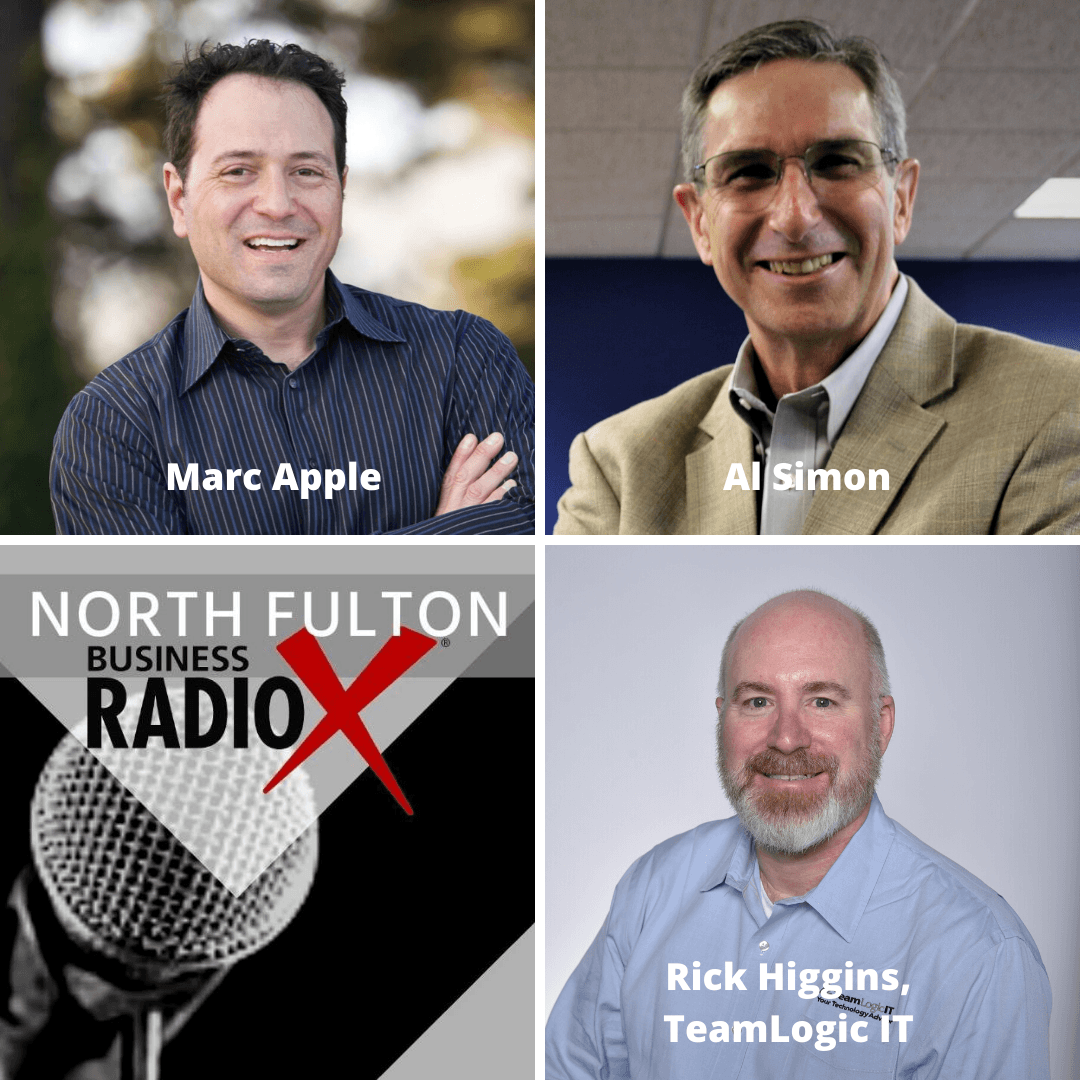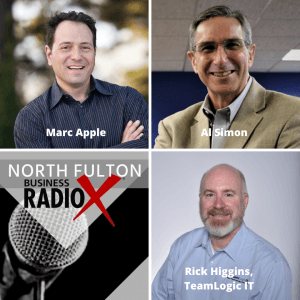

IT Help Atlanta with Rick Higgins: Marc Apple, Forward Push, and Al Simon, Sandler Training by Simon Inc.
On this edition of “IT Help Atlanta,” Host Rick Higgins welcomed Marc Apple, Forward Push, to talk about digital marketing for businesses. Al Simon of Sandler Training also joined the show to discuss his sales consulting and training practice. “IT Help Atlanta” is brought to you by TeamLogic IT, your technology advisor.
Marc Apple, Forward Push

Marc Apple is the Owner and Inbound Marketing Specialist with Forward Push. Forward Push is an award-winning marketing agency that believes that you don’t have to grow your company alone. Through a team of creative thinkers and analytic problem solvers, Forward Push is ready to challenge the status quo while staying rooted in the research.
The team accomplishes this through specializing in content-driven strategies for small and medium-sized businesses. Based on your unique needs, Forward Push creates a custom strategy that takes account for the ever-changing landscape of digital marketing and looks to future developments. This approach includes website design and development, social media management, blogging, video production, digital advertising and branding.
Through this, Forward Push optimizes your online presence and propels you to your goals by implementing, testing, and refining so your brand is always leading, not following. It’s the Forward Push way. Learn more about their process at forwardpush.com or get in touch directly with Marc by email.
Al Simon, Sandler Training by Simon Inc.

Al Simon is the President of Sandler Training by Simon Inc.
Sandler trainers have already had highly successful careers as sales and management professionals, and now use the Sandler sales methodology in their mission to train and mentor others to be successful. Other companies employ trainers who may have never actually sold or managed.
The Sandler sales methodology fosters an attitude of leadership, rather than just emphasizing technique. Reinforcement training facilitates the development of new and empowering behaviors, attitudes, and sales skills, mapping a unique road map to lasting success.
Over 250 local training centers in major U.S. cities and more than 27 countries, plus materials translated into 20 languages, allow us to support our clients almost anywhere in the world, whether you’re a small to mid-sized company or a large organization.
For more information, go to Al’s website or contact Al directly at 770-622-7000.
About “IT Help Atlanta”

“IT Help Atlanta” profiles small to mid-market businesses and highlights how those companies use technology to succeed. The host of “IT Help Atlanta” is Rick Higgins.
“IT Help Atlanta” is brought to you by TeamLogic IT, your managed services technology advisor specializing in cybersecurity, cloud and business continuity solutions. TeamLogic IT leverages cutting edge technology to solve all types of business problems.
For more information, email Rick directly or go to ITHelpAtlanta.com.
Show Transcript
Announcer: Broadcasting from the Business RadioX studios in Atlanta, it’s time for IT Help Atlanta, brought to you by TeamLogic IT, your technology advisor. Now, here’s your host, Rick Higgins.
Rick: Hey, good morning, everybody. And welcome to the IT Help Atlanta radio show, the show that profiles small, and medium-sized market businesses and highlights how those companies use technology to succeed. IT Help Atlanta is brought to you by TeamLogic IT, your managed services technology provider. Specializing in cybersecurity, cloud, and business continuity solutions, TeamLogic IT leverages cutting-edge technology to solve all types of business problems. Go to ithelpatlanta.com for audio archives of this show and to learn more about our sponsor, TeamLogic IT. I’m your host Rick Higgins. And today’s special guest is Marc Apple with Forward Push. Good morning, Marc.
Marc: Morning, Rick. How are you today?
Rick: Oh, man, I’m doing great. Thanks. I’m really glad to have you on the show. Marc, tell us who you are, and what do you do?
Marc: Sure. Thank you for having me. My name is Marc Apple, and I am the founder of Forward Push. We are a marketing agency that specializes in helping small businesses and startups to get back to doing what they love to do, which is typically their job, and they don’t have time for marketing. That’s where we fill in. We are their marketing agency.
Rick: And Marc, you guys are so much more than that. I know that a big part of what you do is website work. Could you drill into that or lean into that and talk to us about what you do with website and how that works with your marketing?
Marc: Sure. There’s a good percentage of our clients that come to us because they have a need, just like you said for a website. We all know nowadays that it’s one of the first things that people do. So, they search, they needed something, they have a problem, they go to the Internet, and you lead them to your website. And that’s where our engagement starts with our clients. But you’re right, it is so much more. After that website is built, what are you gonna put on that website so it keeps engaging people? And that’s really where our work comes in.
So, for the small business owners and the startups. We’re writing their monthly blogs for them. We are doing infographics, design work. We’re doing videos. We’re creating their email newsletters. We’re running their Google ads, their Facebook campaigns. So, it’s a full-service agency. And the idea is that the small business owner is super busy. They don’t have time to do all of these things or maybe just some of these things. So, they’re able to work with us because we love working with them. So, it’s a smaller scale operation on how we work with them, but it’s a long-term thinking and it gives them the ability to compete with the bigger players in the market.
Rick: So, that actually leads me into my next question. And you say you work primarily or maybe even exclusively with small businesses. But can a small or local business compete with large competitors?
Marc: A hundred percent. A hundred percent. We find that day in and day out. It’s certainly a long-term strategy because if you’re going up against a billion-dollar company in your industry, they’re spending money like water, but that doesn’t mean that you have to spend money like water as a small business owner. So, what we tend to do is take a really hyper-local focus. Most small businesses, for the most part, are working in their neighborhoods or in a metro city location. And while those bigger companies certainly are working in those metro locations, they tend to be focused on, for an example here, the whole country. And we know that people like doing business with people. So, when you take that local attitude and that strategy, combining that with the know, like, and trust of working with someone local that you can see, that you can talk to, you can go into their store, they can come to your location, it makes it almost very easy to compete because we have a very tight focus on where we’re attracting clients to our clients.
Rick: Well, you talk about not spending money like water, and I know for all the small business people out there, myself included, they really appreciate that. How as a small business owner should I determine what my marketing budget should be? Is there like an ideal metric for that?
Marc: There is. And typically, we’re looking probably in the 10 to 15% of annual gross as a marketing budget. And so that 10 to 15%, it can be a wide range. Certainly, when we’re working with a small business owner, I like to say that we’re not looking for a big check right away. That’s not even in our plan. Our idea is to start, not conservative so that you’re not doing anything, but start so that you can get some movement, start gaining traction on the low-hanging fruit, and then you can move up that scale to spend more because you’re actually making more.
Rick: Right. So, that 10 to 15%, you’re talking about gross of a startup company or does that carry forward into a mature small business?
Marc: Mature business as well. So, that’s for this annual sales…
Rick: Gotcha.
Marc: …is a good number to start at. Yeah.
Rick: Okay. Well, thanks for that. Thanks for diving deep on that. Hey, Marc, give us a success story. And it doesn’t have to be anything recent. I mean, something that you’re really proud of. Talk to us about how you help someone or solved a particular problem with someone.
Marc: I think what I’ll do is I’ll touch on a story of something that’s happened recently since we’re kind of going through this pandemic. And it’s sort of hoarding small business owners, you know, and businesses across the country, not only here in Atlanta. But we work with a healthcare provider that does elective surgery. And basically, as soon as the pandemic started, they had to shut down. They weren’t allowed to see prospective patients or even patients or even provide the surgery at their location. So, it was almost an immediate shutdown for them, which is devastating to them. We were able to offer telemedicine to them, but in a unique way. So, if you go to their website now, one of the first things you see is that you can text message the doctor. And this actually goes through a HIPAA-compliant system that we have for them. So, you’re not actually text-messaging the doctor’s actual cell phone. It’s through, again, a HIPAA server.
And the doctor is able to converse with the prospect or a patient as if it’s a text message conversation. But to even make it better and where we’re seeing the success is that he can do consultations. You actually can click a button on your phone and you’re able to open your camera and you can have an actual conversation with the doctor. You can show the doctor the part of your body that you’re talking about. You can upload images to them. So, the doctor is now able to do consultations when he actually can’t be physically in front of anyone. The best part of it is that his schedule is completely booked out for next month on the condition that we’re gonna be able to see patients next month. So, it’s finding those ways when there is something that’s facing us that’s a real stumbling block, it’s a roadblock, and saying, “Okay. Well, how can we sort of maintain business as usual in these times where it’s not so unusual?
Rick: My key takeaway on that particular answer was that you put the system on a HIPAA-compliant server. Could you talk more about that and why that’s important?
Marc: Sure. So, it’s important because it has to do with the regulations of the healthcare industry. And when you start to fill out a form, in this case, on a website that has to do with a medical practice, your information is either secure or it’s not secure. So, a HIPAA-compliant server where that information that the person puts into the form, and that can be anything from your name to your date of birth to even saying, “I have a pre-existing condition,” or, “I have this condition,” is sensitive information. So, when you hit submit, if that’s not secure, that information can be hacked. And it basically can be out there for anyone to see. So, a HIPAA-compliant server allows the information to be secure. And when it reaches the doctor, the endpoint, they also have it secured on their side as well when they’re replying. So, it has to do with security, it has to do with the patients, their confidence, and making sure that their information stays secure.
Rick: That’s great. And Marc, I appreciate that deeper dive on that aspect because, you know, obviously, the show is about you and your company. But, you know, as you got from the intro is we definitely want to talk about how companies like yourself are using technology and, in this case, it seems like special technology to serve your client base. So, thank you for that.
Marc: You’re welcome.
Rick: So, you know, as a marketing company, what… I know that you talk the talk, but do you walk the walk with what you do? I mean, how do you find your clients?
Marc: Yeah. We certainly do walk the walk and the talk 100%. One of my rules for Forward Push is that we won’t recommend anything to a client without doing it ourselves first. So, if a new technology comes along, we’re the guinea pig. I’ll invest the money in that platform, in that software, in that marketing tactic first to figure it out, to see how it works. What are the opportunities? So, we’re doing everything from blogging consistently. We have an email newsletter that goes out a couple of different times a month. I also have my own podcast that turns into a video podcast that we put out. We also do our own social media. So, all of the things that we offer to our clients we’re doing ourselves. And when we see a change in what we’re doing or, again, maybe there’s a new platform coming out, we’re shifting just as we would tell one of our clients to do, following best practices.
Rick: Do you wanna give a plug and promote your video podcast right here?
Marc: Sure. Thank you very much. It’s called “Your Marketing Minute.” And that can be found on YouTube and if you listen to audio on any of the podcast channels.
Rick: That’s great. I’m definitely gonna check that out.
Marc: Thank you.
Rick: Here’s an interesting question for you, Marc. It’s one that I always like to ask and what’s an aspect about your business that people don’t generally think about, but that you wish people would ask you about?
Marc: That’s good. I love that question, Rick. Thank you for asking that. I think one of the things is that we all have this perception that the internet is instant, and in some cases, it is. You’re gonna record this podcast today. It literally can be upon your website this afternoon, right? In real-time, this could be a live stream. You could write a blog post this afternoon, hit submit, and it’s live on your website. So, things are instant, right? You can go on Amazon. You practically can have your groceries in a couple of hours if you wanted to. So, it is instant. The flip side of it when you talk about for a small business and marketing is things aren’t that instant. Certainly, you can do the same thing. Write that blog post and hit submit for that small business website. It doesn’t mean that Google is gonna all of a sudden start driving traffic to it.
And that’s one of the biggest misconceptions that I usually end up speaking to our clients about is that these things do just take time. So, it’s not only the blogging example, but you could start a pay-per-click campaign today on Google or you could start a Facebook advertising campaign. It takes these powerful algorithms and these powerful companies to figure out how to serve your ad best. Even in Facebook, if you were to run advertising, for the first couple of weeks or so, and that’s sort of a general until it’s starting to get enough data, it actually says in the ad portal learning, meaning that it’s still trying to figure out who best to serve your ad to. All the while it’s charging you for this learning experience.
Rick: Yeah. So, this is the algorithm that’s saying that it’s learned? Is that what’s going on?
Marc: Yes. Yes. So, that’s what’s going on. And so that also happens on Google with pay-per-click. So, it’s the instant of, I’m running ads, but the actual conversions or starting to see sales can take some time because there’s a lot of things that go into play, so a lot of moving parts. And that’s one of the questions that I think, for me, that I have to kind of make sure small business owners understand. So, it’s not one I get asked often, but it’s one that I’m giving the answer often.
Rick: Got it. I’m gonna lean into that a little bit more. Full disclosure to the audience here, Marc and I are friends. We’ve been friends and business associates for some time now. And, Marc, I’ve heard you talk before about how important the local aspect of internet and website marketing is as compared to national stuff. And you mentioned I think the statistic was that 40% of website clicks are for localized searches. Could you talk about that?
Marc: Yeah. I think you’re talking about a stat that you and I were conversing about that last year of all the Google searches, so all the searches, 48% had some local intent.
Rick: There you go.
Marc: Yeah. What that means by local intent, somebody put in a city name. So, they put in Atlanta or they put in the zip code 30341 with whatever they were looking for. So, it might have been a Chinese restaurant, Chamblee, Georgia. It’s a local intent versus putting Chinese restaurant. The same thing looking for a managed service IT provider. If you’re not putting in that city or zip, the results that you’re going to see are gonna be kind of scattered for the most part. There are some instances where you will sort of get the best local results, but just even think about your own habits, Rick. Probably when you’re searching whether it is that Chinese restaurant or a new place to go out to or whatever it is, you’re probably including some type of localization characters to get the best results for you.
Rick: You’re right. I do. I don’t even think about it. I just type it in. I might even type in just my zip code.
Marc: Yeah. And we see that a lot. The other thing that people are starting to do is even take it one step further and Google sort of has been encouraging this is that you start to type in, you know, Chinese restaurant and it starts to tell you, “Near me, nearby,” and that’s because we’re all searching on our phones nowadays. And as you know best, this phone is connected to a GPS system that knows exactly where I’m standing. So, when you do that search, and you do the near me, nearby, it knows exactly where you are. And it will tell you how many feet away you are from that restaurant or how many miles away, right?
Rick: A little bit scary.
Marc: A little bit scary, but also quite useful for a small business owner to realize that this is how, you know, the most powerful search engine in the world, Google, is steering how people find you. And if you don’t have a website that’s built on local intent, you can start missing out. And that’s the scary thing as well. I would say that’s almost scarier than, you know, a giant GPS system knowing where you’re standing.
Rick: Yeah. Yeah, you’re right. Marc, what do you like best about being a small business owner?
Marc: I like the independence of it. I come from a Fortune 500 background. I worked for some pretty big, well-known companies. And the reason I left it was, like, I kind of got fed up. I saw a lot of small business owners spending money with these big companies and not having success because they were sort of just another client. It’s different with me and how I act and how my team acts. So, for us, you know, every client we have, we know who their kids are, we know when their birthdays are, and we know a lot about their business. It kind of goes back to how we started this conversation, Rick. It’s like how we positioned Forward Push and the work we do is we are the marketing team for that small business. And that means that my team has to know sort of as much about the business as the owner does. And we’re working with a bunch of clients. So, for me, I just love knowing and working with a bunch of different business owners that all sort of have the same mentality. They all want success. That’s what every small business owner wants because they’re the ones writing the checks. When you start to work with the corporate clients, it’s just a person coming in there that’s got a spend budget that quarter, and they’re not really attached to the check. That’s the difference and that’s what makes me get up in the morning.
Rick: That’s great, Marc. That’s a great answer. Marc, tell the audience how to get in touch with you.
Marc: Yeah. The best place to find me is forwardpush.com. That’s our website. And if you’re on social media, all of our channels are under Forward Push.
Rick: That’s great. Marc, thank you so much for being a guest today on IT Help Atlanta. We really appreciate you. And folks, go to ithelpatlanta.com for audio archives of this show and learn more about our sponsor, TeamLogic IT. Go to forwardpush.com to learn more about Marc Apple and his wonderful company, Forward Push.














